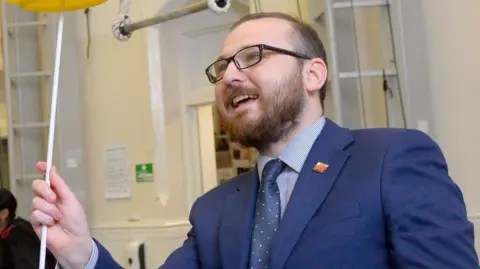No crisis in Wales' culture sector, says minister
 Arts Council of Wales
Arts Council of WalesThe minister responsible for culture in Wales has denied the sector is facing a funding crisis.
A Senedd committee inquiry into the Welsh government's budget for 2025-26 has raised "significant concerns" over whether Jack Sargeant "fully appreciates" the pressure that arts, sports and heritage bodies are under.
It comes ahead of a vote on the spending plans on Tuesday, which Labour ministers are expected to win.
The Welsh government defended its minister, saying he secured "vital funding for 60 arts organisations" in the past few months.
The claim of a funding crisis came from the Arts Council of Wales, which distributes public funding to arts groups.
When it was put to the minister by the committee at a meeting, the culture minister said: "I wouldn't describe it as a crisis myself."
He said there were "challenges" which the government would work to overcome.
In a report on the budget, the culture committee said increased funding for the arts, historic environment and sports in the budget was "a step in the right direction".
"However, taking into account the evidence we have received about the depth and impact of the funding situation, and the sector's own use of terms such as 'crisis', we have significant concerns about whether the minister fully appreciates the extent of the pressures the sector is facing," it added.
Welsh government funding has kept some organisations and venues open, the report said.
But MSs heard "many more examples throughout our recent inquiry about other organisations and venues that are struggling".
The Welsh government said Sargeant "has secured an in year package of immediate support through the resilience fund, providing vital funding for 60 arts organisations across Wales" during his six months in office".
It added ministers had announced an increase in the draft arts and culture budget for 2025-26.
National insurance warnings
Committees in all policy areas have been dissecting the budget ahead of Tuesday's vote.
They have made repeated warnings about the impact of the UK government's National Insurance hike for employers.
Extra funding has been promised to help public sector employers cope with the cost, but it will not be available for private businesses providing services, such as companies running care homes.
The culture committee called on ministers to confirm "as a matter of urgency" whether government-funded organisations, including museums, will be shielded from increases in NI contributions.
National Museum Wales, for example, faces increased costs of £500,000 – more than half its estimated £900,000 in extra funds for day-to-day spending.
The Senedd's children and young people's committee said it was "deeply concerned" about the impact on charities, calling for ministers to accelerate their work to assess and reduce the impact.
It also raised questions about funding for childcare, saying it was not clear whether a plan to extend the Flying Start service to all two-year-olds is fully funded.
 Getty Images
Getty Images'Challenging times'
The local government committee said councils were still in "very challenging times" and continued to face "substantial budgetary pressures which will most likely lead to council tax increases and cuts to services".
"We heard that local government is lacking any certainty around budgets and is clearly struggling," a report said, calling for longer term financial planning to "avoid a cliff edge every year".
It urged ministers to provide a "funding floor" to protect councils that are expecting to receive increases to their budget far below the average of a 4.3 % increase – something the Welsh government says it is open to.
Under the Welsh government's funding formula councils with older and more rural populations tend to receive less money – such as Monmouthshire, Powys and Gwynedd. The committee called for a full review of the formula "to ensure that it distributes funding fairly".
It also raised concerns about national insurance, saying it was not clear how much or when any additional funding would be provided to councils.
The Welsh government has said it will consider the Senedd reports.
Budget vote
The Labour Welsh government is poised to win the vote on its draft budget as the Conservatives' leader and another of his members have gone to the US for a prayer meeting in Washington DC.
Darren Millar and Russell George are going to the National Prayer Breakfast where Donald Trump is expected to give a speech, meaning the pair will miss the Senedd's first opportunity to debate and vote on next year's spending plans.
Those attending from the Conservative group will vote against the proposals, as will Plaid Cymru Senedd members.
It is not known whether the only Liberal Democrat Senedd member, Jane Dodds, will choose to vote against the budget on Tuesday or abstain.
Tory MS Sam Rowlands said: "Without tackling wasteful spending across departments, the Welsh Labour government will never be able to fully prioritise the Welsh NHS and tackle excessive waiting times that are still increasing to new record highs, month after month."
The party's Heledd Fychan said: "Labour's Budget is not one that will address the crisis facing the education or culture sectors, it won't fix the NHS, and neither will it mean that Councils across Wales will be able to properly deliver key public services that our communities rely on."
